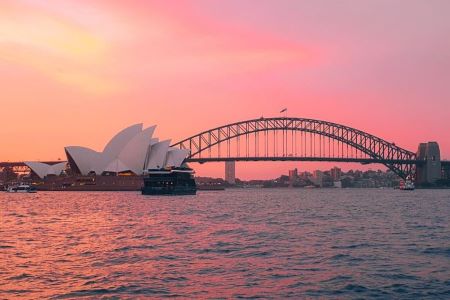Friday, December 6, 2024

As the rise of overtourism disrupts once-peaceful destinations across Europe, travelers are increasingly searching for quiet, serene spots to escape the crowds. A recent study reveals the top countries where visitors can find the greatest relaxation. While Australia claims the top spot, Northern European countries outshine Mediterranean destinations, largely due to their rich historical wellness culture and commitment to maintaining calm, less crowded spaces.
Factors Defining a Relaxing Destination
To determine the most relaxing countries, over 76 destinations were carefully analyzed using The Global Relaxation Index, which focused on five critical factors: safety, solitude, serenity, nature, and wellness. Each destination was scored based on various metrics such as the amount of protected land and forest, crowd density, noise pollution, and the availability of wellness experiences. This approach allowed for a comprehensive ranking, revealing which countries offer the ultimate escape for travelers seeking peace and tranquility.
Australia and Canada Lead the Way
Australia emerged as the number one destination for relaxation, owing much of its top ranking to its vast size and relatively low visitor numbers. Despite its expansive area, Australia is far less crowded compared to European destinations like Italy. In fact, Australia has 25 times more land but 50 million fewer visitors annually than Italy. The country’s impressive natural landscapes, including stunning beaches, rainforests, and the iconic outback, contribute to its reputation as a serene getaway.
Canada closely follows, securing second place on the list. Known for its stunning natural wonders, including the Northern Lights, vast forests, and lakes, Canada offers an abundance of wellness experiences—over 4,700 to be exact. The country’s natural beauty and commitment to preserving its wilderness make it an ideal destination for those seeking relaxation and solitude.
Iceland and Finland: Europe’s Quiet Escapes
In Europe, Iceland and Finland topped the list, both being known for their wide-open spaces and peaceful environments. Iceland, in particular, scored highly in terms of safety and serenity, making it the most highly-rated European country. The country’s sparsely populated regions, active volcanoes, natural springs, and the mesmerizing Northern Lights contribute to its tranquil atmosphere, making it an ideal destination for travelers looking to reconnect with nature.
Finland was not far behind, securing the fourth spot. Similar to Iceland, Finland has a very low population density—less than 20 people per square kilometer—which helps maintain its calm, peaceful vibe. The country also boasts a rich tradition of wellness and is home to many wellness resorts and saunas, making it a perfect location for travelers seeking relaxation.
Other Leading Relaxation Destinations in Europe
Several other Northern European countries also ranked highly for relaxation, thanks to their green spaces and slower-paced lifestyles. These included Austria, Sweden, Estonia, and Norway, which were praised for their smart, eco-friendly cities and wealth of wellness traditions. Portugal also made the top 10, securing the 10th spot on the list, largely due to its welcoming climate and growing focus on wellness tourism.
Despite the summer crowds, Spain managed to remain in the top 20, ranking at 16th, while France placed lower at 33rd. This suggests that while some Mediterranean destinations continue to attract large crowds, they still offer pockets of peace and wellness, especially in less-traveled regions.
Africa and Its Emerging Tranquil Destinations
Interestingly, Africa also made its mark on the relaxation index, with Botswana and Namibia ranking higher than traditional European favorites like Greece and France. These countries are praised for their expansive wilderness areas, which offer travelers a chance to experience peace and quiet away from the crowds.
Impact on the Travel Industry and Global Travel Trends
The findings of this study have significant implications for the travel industry. With overtourism becoming a growing issue, especially in popular European destinations, travelers are increasingly looking to explore quieter, less crowded locations. Countries like Australia, Canada, and Iceland are likely to see a continued surge in visitors seeking nature-based experiences and wellness retreats.
Additionally, wellness tourism, which encompasses everything from yoga retreats to spa treatments and mindfulness experiences, is expected to continue its rise in popularity in 2025. This trend will likely benefit countries with a strong wellness infrastructure, such as Finland, Canada, and Austria, who are well-positioned to cater to these travelers.
Summary of Key Insights
Australia and Canada are leading the global relaxation index due to vast landscapes, low population density, and abundant wellness experiences.Iceland and Finland rank highly in Europe for their serene environments, low crowd density, and commitment to wellness traditions.Northern Europe and Africa are emerging as popular destinations for peaceful escapes, while traditional Mediterranean countries like Spain and France are facing challenges due to overtourism.Wellness tourism is set to rise further in 2025, benefiting countries with natural beauty and wellness offerings.
Global Effects on Travelers Travelers are becoming more conscious of overtourism and are seeking destinations that offer a peaceful, relaxing experience. This trend has the potential to reshape global travel patterns, with more visitors flocking to countries that prioritize sustainability, wellness, and natural beauty. The increase in demand for serene and less crowded destinations will likely spur infrastructure development in these quieter regions, offering travelers more options for tranquil getaways.
